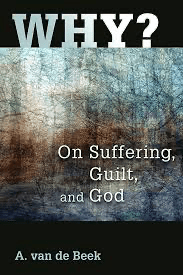“Why?” Chapter II, Parts 6-8: My Commentary
This blog post continues my commentary/review of Dutch theologian A van de Beek’s book “Why? On Suffering, Guilt and God.” This is part of a series, a kind of “book club” within this blog. I have already commented on Chapter I a couple weeks ago.
Whenever I read a non-fiction book, especially a theological book, I look closely for THE key sentence (or two or three together) in each chapter. That is the pattern I will follow here. However, I have to be careful not to over-quote the book due to copyright laws.
In Part 6, “The Disciplining Father,” Beek begins his discussion of theological views of God’s relationship with the world that begin with God’s omnipotence and attempt to solve the problem of evil by appealing to “God as the Source of All Things” (the title of this Chapter II).
The first solution with which he deals is the well-known idea that God sends and permits suffering to draw people closer to himself. He raises some questions about this model such as the suffering of people who do not know God at all or have any relationship with him. Surely God is the God of all; why, then, does he send or permit their suffering?
The second solution with which Beek deals is the also well-known idea that the ways of God are strange and beyond our comprehension. This one (pp. 38-54) does not satisfy Beek. It reminds me of the old hymn “God Moves in A Mysterious Way (His Wonders to Perform” which says that “Behind a frowning providence God hides a smiling face.”
Here, in this Part, Beek admits that his writing is “less coherent” than readers might want. “I am aware as I write that the line of thought zigzags a bit….” (53) The idea he is dealing with here both attracts and repels Beek. Yes, the suffering of Jesus on the cross was scripted by God for a (to us) mysterious end and so might all suffering be thought of that way, but at the same time, it is difficult to believe that one’s whole life and the whole of human history is “scripted” by God—because of the horrors of suffering. Here I would bring in the suffering of children which Beek does not. I think it would help his case if he did.
In Part 8 Beek deals with the model of “Suffering as Judgment Upon Sin” (pp. 54-75). What is happening here, in this part? Again, Beek is explaining the model—that all suffering is directly or indirectly God’s judgment on humanity’s sin (not necessarily the suffering individual’s specific sins)—and simply telling us what he thinks are its strengths and weaknesses. Very telling about his own theological attitude toward God is the final sentence of this part: “As a father takes his child into his loving arms, God has compassion on the human being who has been broken under judgment. In the loving embrace of the Father the broken-hearted are healed.” (75)
A close reading of these parts of Chapter II reveals several things. First, Beek is telling us some of the major models of God and suffering offered up by theologians and lay Christians. Second, he is telling us what he seek as their strengths and weaknesses. What becomes clear now is that Beek does NOT take the traditional, classical, historical Reformed or Calvinist approach to God’s providence. To borrow a phrase from American Baptist theologian E. Frank Tupper, “God is not a do anything, anytime, anywhere kind of God.” Not everything that happens, especially suffering, is planned and carried out by God. Yet, neither can God be removed from history, including suffering. So what is God’s role in suffering? According to Beek, apparently, the path to an answer that begins with God’s omnipotence (interpreted as God’s determinative power over all) has some value but ultimately cannot do justice to the God of Jesus Christ.
What interests me about these parts of Chapter II is the trajectory I find in the details. They say “The devil is in the details.” Well, whether it is the devil or an angel, the details fascinate me. Here we have a Reformed theologian who absolutely denies that all of history is “scripted” by God or that all that happens is for his glory. He also strongly hints that, for him, hell is not eternal.
Nowhere does he deny that God is omnipotent, but I think it is fair to say that Beek is denying that God’s omnipotence must mean that God is the all-determining reality such that everything that happens happens for a scripted reason. I wish Beek gave us more examples, such as the Holocaust. But I find this to be a weakness is much European Christian theological writing. Specific examples to illustrate general points are often passed over in favor of more abstract propositions left unillustrated.
In the next issue or edition of this series, I will discuss Chapter II, parts 9-11 (pp. 75-120). If you are participating in this “book club within this blog,” look for my next commentary on or about May 26.
*Note: If you are not reading “Why?” With us, please reserve your comments about the book, if any, to questions. I may or may not find time to answer all. If you are reading with us, please do your best to keep up. I will leave ABOUT a week to ten days between MY commentaries. Please keep your comments relatively brief, no more than about 100 words! Also, this to everyone, again, address only me, keep your comments on topic and civil and respectful (not hostile or argumentative) and devoid of pictures or links.*














